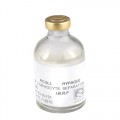Activation of Blood Plasma and Factor XII
Activation of Blood Plasma and Factor XII
Chyi- Huey Josh Yeh,1,• Ziad O. Dimachkie,2,• Avantika Golas,1 Alice Cheng,2 Purnendu Parhi,3 and Erwin A. Vogler*,1,2
A Contribution from the Hematology at Biomaterial Interfaces Research Group
Abstract
Sepharose ion-exchange particles bearing strong Lewis acid/base functional groups (sulfopropyl, carboxymethyl, quaternary ammonium, dimethyl amino ethyl, and iminodiacetic acid) exhibiting high plasma protein adsorbent capacities are shown to be more efficient activators of blood factor XII in neat-buffer solution than either hydrophilic clean-glass particles or hydrophobic octyl sepharose particles ( FXII surface activator FXIIa; a.k.a auto activation, where FXII is the zymogen and FXIIa is a procoagulant protease). In sharp contrast to the clean-glass standard of comparison, ion-exchange activators are shown to be inefficient activators of blood plasma coagulation. These contrasting activation properties are proposed to be due to the moderating effect of plasma-protein adsorption on plasma coagulation. Efficient adsorption of blood plasma proteins unrelated to the coagulation cascade impedes FXII contacts with ion-exchange particles immersed in plasma, reducing auto activation, and causing sluggish plasma coagulation. By contrast, plasma proteins do not adsorb to hydrophilic clean glass and efficient auto activation leads directly to efficient activation of plasma coagulation. It is also shown that competitive-protein adsorption can displace FXIIa adsorbed to the surface of ion-exchange resins. As a consequence of highly-efficient auto activation and FXIIa displacement by plasma proteins, ion-exchange particles are slightly more efficient activators of plasma coagulation than hydrophobic octyl sepharose particles that do not bear strong Lewis acid/base surface functionalities but to which plasma proteins adsorb efficiently. Plasma proteins thus play a dual role in moderating contact activation of the plasma coagulation cascade. The principal role is impeding FXII contact with activating surfaces but this same effect can displace FXIIa from an activating surface into solution where the protease can potentiate subsequent steps of the plasma coagulation cascade.
Keywords: Autoactivation, FXII, plasma coagulation, ion-exchange







Leave a Reply
Want to join the discussion?Feel free to contribute!